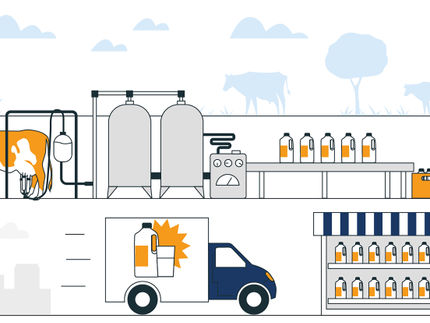"Skimpflation" in the supermarket
When manufacturers cut corners on quality
Advertisement
It's a nuisance for consumers: their favorite chocolate suddenly contains less marzipan, and ice cream now has coconut fat instead of whipped cream. Yet despite a worsened recipe, the products in the supermarket cost just as much or even more than before. "Skimpflation" is the name of this phenomenon, which is difficult for customers to identify when shopping. For that, you would have to compare the small print of the ingredients list of an old package with that of a new one - and who can do that?
The term "skimpflation" is a combination of the English word "skimp" meaning to cut back or save and "inflation" meaning to increase.
Even if it is not possible to put a concrete figure on the financial effects, manufacturers are likely to secure some substantial savings with such recipe changes, says Armin Valet of the consumer advice center in Hamburg. "If, for example, instead of 88 percent spinach in a creamed spinach, there's only 67 percent in the package and it's filled with water instead, that's definitely a huge cost savings, because spinach is by far the most expensive ingredient."
The expert knows of similar examples with margarine: a well-known brand now contains only 60 percent fat instead of the 80 percent prescribed for margarine - and more water instead. "With thousands of tons of annual production, that makes a lot of difference," Valet says. "Oriented to world market prices of vegetable oil, that could well be in the hundreds of thousands, maybe more. But that's just a very rough estimate." For marginal formulation changes, the savings are likely to be correspondingly lower. Through so-called shrinkflation - i.e., product packages with less content offered at the same price - manufacturers could save even more, to the detriment of consumers.
But it's not just consumers' wallets that are affected; poorer formulations can also be detrimental to their health. "For example, if sunflower oil is replaced by palm oil, the food contains more saturated fatty acids," says a spokeswoman for the consumer organization Foodwatch. Replacing high-quality ingredients with sugar is also problematic from a health perspective, she adds. Manufacturers should provide transparent information about recipe changes - and if they use lower-quality ingredients, they should also lower the price, the spokeswoman said. It cannot be that consumers, who currently already have to dig deeper into their pockets when shopping, also receive poorer quality - "while manufacturers make additional profits in the process."
However, the options for taking action against this are limited, as Valet makes clear. Manufacturers would have to adjust the ingredient lists in the case of recipe changes, but they would not have to state specifically what had been changed. In some cases, the product name also has to be changed, and margarine, for example, is then called "spreadable fat" in the small print because it no longer contains enough fat. But this would mean that the manufacturers had already fulfilled the requirements.
In some cases, "new formulation" is then also written on the packages - but what exactly is new is not apparent, or only if there has actually been an improvement, says Valet. And still other manufacturers are not even afraid to sell consumers a deterioration as a "better formulation.
Even if the problem is widespread, there are only isolated complaints, and when there are, they are often unspecific, the expert says.
"Skimpflation is extremely difficult for consumers to figure out, again significantly more difficult than shrinkflation." Valet suspects that there is a high number of unreported cases. The only thing that helps against this is that customers inform themselves well and look closely at the ingredients in finished products. However, better labeling of recipe changes would be desirable, demands Valet.
Food inspectors also see only limited possibilities. "We can only take action if violations due to misleading and deception are obviously suspected," says Maik Maschke, chairman of the Federal Association of Food Inspectors of Germany. Often, he says, information is only received from third parties that "consumers are upset at the shelf in food retail stores about the shrunken size of the packaging, the increased price and declining quality of the products." If such complaints come to the attention of the official food inspection, they are also investigated, he said. Then samples of the food would also be taken.
Investigations in the laboratory, however, could not be about the prices of the products, but only about a correct labeling of the ingredients as well as a comparison of the quantities on the package with the actual contents. "However, it is not unusual for food manufacturers to change the recipe," Maschke says. This is also due to disruptions in supply chains, for example, due to food shortages caused by the Ukraine war or the Corona pandemic.
Note: This article has been translated using a computer system without human intervention. LUMITOS offers these automatic translations to present a wider range of current news. Since this article has been translated with automatic translation, it is possible that it contains errors in vocabulary, syntax or grammar. The original article in German can be found here.
Other news from the department business & finance
Most read news
More news from our other portals
See the theme worlds for related content
Topic world Food safety
Food safety is at the heart of the food and beverage industry. It ensures that the food we eat every day is not only nutritious, but also free of harmful contaminants. From field to plate, the industry monitors and regulates every step of the process with strict quality controls, advanced testing methods and continuous research.

Topic world Food safety
Food safety is at the heart of the food and beverage industry. It ensures that the food we eat every day is not only nutritious, but also free of harmful contaminants. From field to plate, the industry monitors and regulates every step of the process with strict quality controls, advanced testing methods and continuous research.

































































